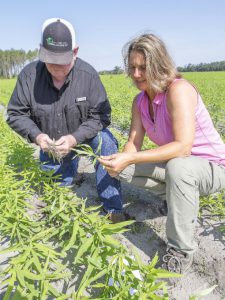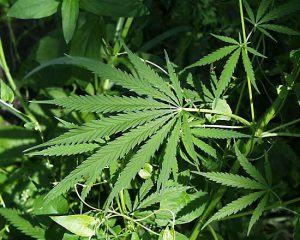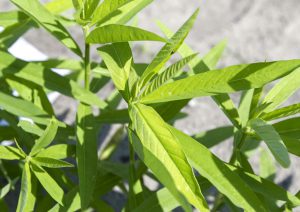Cover crops are used in commercial agriculture to promote soil health by adding organic matter to the soil. They are often termed green manure since they enhance soil microbial communities, add herbage to the soil, and help the soils to maintain water and nutrients. In the Tri-County Agriculture Area (TCAA), they are generally planted after the potato harvest to rejuvenate the soil prior to the next planting season. Upon maturity, cover crops are tilled back into the soil and serve as an affordable on-site management strategy to increase soil organic matter and fertility. Sorghum sudangrass and field corn are common cover crops used in the area, but Sunn Hemp is becoming a more common alternative.
Sunn Hemp (Crotalaria junicea L.) has two major advantages over the common cover crops used in the area. It is a legume, which means it contains nitrogen-fixing nodules in the root zone that actually capture nitrogen from the atmosphere and add it to the soil. So it serves as a natural fertilizer for the soil. It also is known to suppress plant parasitic nematodes that are present throughout the soils in Northeast Florida. According to Wang and McSorley (2018), Sunn Hemp is not a host for nematodes and the leaves actually contain a toxic extract that can be lethal to certain types of nematodes (http://edis.ifas.ufl.edu/ng043). Once it is tilled back into the soil, Sunn Hemp can increase plant tolerance to better resist the invasion of soil nematodes. This means that chemical controls such as a soil fumigation can be reduced and possibly even eliminated.

L&M Farms in Putnam County has been growing Sunn Hemp as a cover crop for the last three years. This year they are planting approximately 800 acres and if you want to see a beautiful stand, just head east on Cracker Swamp Road and glance to your left before you enter the swamp. The greatest advantage they have observed is the reduced nematode pressure since Sunn Hemp is not a host for nematodes. According to Larry Corn, Farm Manager of L&M Farms, they have significantly reduced their fumigation applications as a result of planting Sunn Hemp. The benefits of nitrogen fixation and less chemical fertilizer application also contributes to cost savings. Larry believes this crop is certainly a step in the right direction towards sustainable agriculture.
Sunn Hemp should not be confused with the Industrial Hemp Crop that the University of Florida is currently researching. Industrial Hemp is a Cannabis sativa plant, but the THC content is very low (< 0.3% on a dry matter basis) and it has many industrial uses including fiber and textiles, food (seed oil, greens), forage for animals, building materials and medical benefits through CBD (cannabidiol) oil. Nick Place (Dean of UF/IFAS Extension) recently held a brief discussion on the Industrial Hemp Crop and touched on medical marijuana during his extension connection session on July 23, 2018. If you are interested in this discussion, please have a look at the video recording (https://www.youtube.com/watch?v=Sf4gZ5sL-E8&feature=youtu.be). For clarification purposes, UF is not permitted to work on research associated with the medical marijuana crop production. Upcoming workshops on UF’s research interest in Industrial Hemp and how industries/growers can partner with UF’s Pilot Industrial Hemp Program will be held on August 9 in Quincy, August 10 in Citra and August 13 in Homestead at the respective UF Research Education Centers. Registration is required and a flyer is included here (UFIndustrialHempWorkshopFlyer) with more information on the workshops.


 1
1
